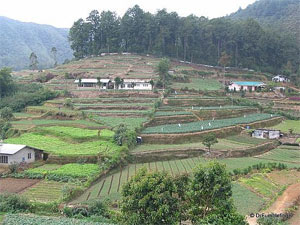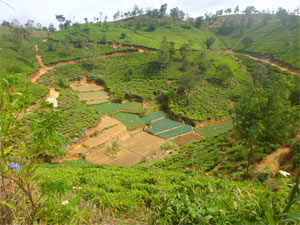How far Up-country Vegetable Farmers can survive under present participatory irrigation management practices by Eng. Thushara Dissanayake Department of Irrigation
|
| |
 |
|
In Sri Lanka Participatory Irrigation Management (PIM) practices dates back to ancient king’s time. Owing to setbacks during the colonial rule the modern participatory management practices have been introduced since 1980s emphasizing the needs of joint decision making between line agencies and farmers, proper water management, maintenance of the systems with the involvement of farmers, and environmental management.
|
|
In fact, one of the objectives of this institutional reform initiated by the financing agencies like the World Bank and Asian Development Bank is to relieve the maintenance cost of the government with the involvement of farmers for maintenance activities. Accordingly, farmers of minor irrigation schemes are fully responsible for the operation and maintenance of their irrigation scheme while in the medium and major schemes, farmers and agency personnel have been made jointly responsible for the management of the systems.
Project Management Committee (PMC) is the institutional arrangement where line agencies and farmer representatives convene to discuss and make decisions on scheme related matters. A Project Manager is appointed for each scheme who has to coordinate all activities of the scheme with farmers and other line agencies. Project Management Committees (PMC) is convened monthly to discuss matter related to the scheme and joint decisions are made. PMC consists of selected farmer representatives and scheme level officers of line agencies and it is responsible for the scheme level management. The line agencies should represent irrigation, agriculture, marketing, credit and other administrative functionaries.
This article is based on the vegetable farmers in Badulla and part of Nuwaraeliya district, known as upcountry vegetable farmers, and their issues related to PIM. These farmers produce vegetable and other field crops for commercial purposes while some of them are used to cultivate paddy during Maha season for their own consumption.
|
|
Apparently, participatory Irrigation Management has not been able to serve the intended purposes due to less involvement and participation by the farmers in this area. As a result, less contribution to maintenance activities, inefficient and excessive water usage where tail end farmers suffer with water scarcity, non-adherence to cultivation schedules, damaging irrigation structures, encroachment of reservations are the prominent problems. Hence, the regular PMC has been a place of solving conflicts where other important matters receive less attention.
|
|
 |
|
Many attempts to improve prevailing situation have taken the form of farmer training and education but without a considerable improvement. Hence, it is needed to analyze the situation beyond technical scope by considering socio-cultural, political, technical, legal and marketing aspects to find reasons and to propose viable solutions to this declining trend of PIM.
At present, many issues beyond scheme level have immerged with regard to transportation and marketing of vegetables due to unfair practices of middlemen and up country vegetable farmers are without exception. Present PIM is unable to address these issues due to its limited scope. A mechanism that extends beyond present PIM approach has to be introduced to find solutions to above issues.
|
| |
|
|
| Download the Full Article |
|
|